Randy Alcorn's Blog, page 2
August 13, 2025
How Can We Avoid “Believing” the Bible While Denying What It Actually Says?

Psalm 1 reminds us just how important delighting and meditating on God’s Word is. Here’s how the CSB renders it (note the use of “happy” in verse one for the Hebrew asher, often translated “blessed”):
1 How happy is the one who does not
walk in the advice of the wicked
or stand in the pathway with sinners
or sit in the company of mockers!
2 Instead, his delight is in the Lord’s instruction,
and he meditates on it day and night.
3 He is like a tree planted beside flowing streams
that bears its fruit in its season
and whose leaf does not wither.
Whatever he does prospers.
4 The wicked are not like this;
instead, they are like chaff that the wind blows away.
5 Therefore the wicked will not stand up in the judgment,
nor sinners in the assembly of the righteous.
6 For the Lord watches over the way of the righteous,
but the way of the wicked leads to ruin.
In order to delight and meditate on the law of the Lord, we must understand correctly what Scripture actually says. Sometimes I’m struck by how many Christians say they believe the Bible, but their interpretations are so out of line with credible biblical meanings that their profession of confidence in Scripture becomes meaningless, and even dangerous. Not only is this happening more frequently today, it’s also being accepted as normal.
Historically, theological liberals denied Scripture, and everyone knew where they stood. But today many so-called evangelicals affirm their belief in Scripture, while attributing meanings to biblical texts that in fact deny what Scripture really says. Hence they “believe every word of the Bible” while actually embracing (and teaching) beliefs that utterly contradict it.
I’m not talking about mere differences within the sphere of orthodoxy, such as the debates between Calvinists and Arminians, or various interpretations for some of the most difficult problem passages or intramural squabbles about spiritual gifts or ordinances or church polity. I’m talking about people believing and confidently affirming that Scripture says what no one in the history of the church ever believed it says—or some people did say it but were easily recognized as heretics. (Universalism is just one example among many, though an important one.)
We rightly call upon people to read their Bibles, but it seems many spend much more time reading into the Bible than reading out of it. So nearly everything they read becomes a mere echo of what they already think or what most people around them are already saying. God gave us His Word to teach, rebuke, correct, and train our thinking (2 Timothy 3:16), not so we could interpret it away into a mirror image of our preferred beliefs.
You can believe in the inspiration and even inerrancy of God’s Word, but because your subjective interpretation doesn’t center on the author’s (and Author’s) intention, but on what seems right to you and the secular or church culture, the Bible isn’t really your authority. You don’t let it correct your thinking but walk away with an interpretation which conveniently supports your comfortable beliefs.
If you’ve never watched John Piper’s Look at the Book series, I highly encourage you to do so. In one of the early sessions in Finding Meaning in the Bible, he talks about The Golden Rule of Bible Reading. Just as we would like people to understand what we actually mean by our words, so we need to find the intended meaning of the biblical authors, not superimpose on Scripture our own preferred meanings.
This reminds me of the challenge small group Bible studies face where the main question can easily become “What does this passage mean to you?” instead of “What did it mean to the author and original readers?” Only when we ask that second question can we then figure out how to properly apply God’s Word to our own lives. (Of course there are numbers of passages where we can’t be 100% certain of the meaning. But overall, there is much clarity of meaning in Scripture. Otherwise, reading the Bible would be meaningless because the Holy Spirit could never change or transform us through words we can’t know the meaning of, or to which we can feel free to ascribe any meaning we wish.)
We need to learn, and teach other people, not just to read the Bible but also how to interpret it, so they don’t end up being Bible-believing heretics or Jesus-followers who follow a Jesus different than the real Jesus of the Bible and history.
I find myself wishing people would know they are denying Scripture, and not feel free to use Scripture to deny Scripture. If you’re aware that you disbelieve and reject the Bible, there is hope because you can come under conviction to submit to God by denying your preferences and accepting what Scripture actually says. But if you imagine you believe the Bible all along, when in fact your interpretations contradict it, pride can blind you from knowing the truth. Therefore, the truth cannot set you free.
Recommended Reading
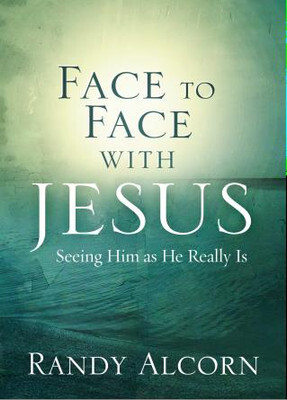 Face to Face with Jesus
Face to Face with Jesus 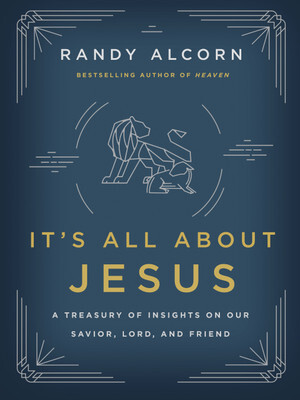 It's All About Jesus
It's All About Jesus
August 11, 2025
The Best Part of the New Earth Will Be Enjoying God’s Presence

The 1998 movie What Dreams May Come portrays Heaven as beautiful but lonely, because a man’s wife isn’t there. Remarkably, someone else is entirely absent from the movie’s depiction of Heaven: God.
That movie’s viewpoint mirrors numerous contemporary approaches to Heaven which either leave God out or put Him in a secondary role.
The Five People You Meet in Heaven, a best-selling novel by Mitch Albom, portrays a man who feels lonely and unimportant. He dies, goes to Heaven, and meets five people who tell him his life really mattered. He discovers forgiveness and acceptance, all without God and without Christ as the object of saving faith.
Five People portrays a Heaven that isn’t about God and our relationship with Him, but only about human beings and our relationships with each other. A Heaven where humanity is the cosmic center, and God plays a supporting role. The Bible knows nothing of this pseudo-Heaven.
Numerous people claim to have gone to Heaven and seen loved ones and also Jesus, yet almost never do they react as the “beloved disciple,” the apostle John, did: “When I saw him, I fell at his feet as though dead” (Revelation 1:17).
Surely no one who had actually been in Heaven would neglect to mention what Scripture shows is its main focus. If you had spent an evening dining with a king, you wouldn’t just talk about the place settings! When John was shown Heaven and wrote about it, he recorded the details—but first and foremost, from beginning to end, he kept talking about Jesus, the Lion and the Lamb, with infinite gravitas and beauty.
A Honeymoon without a Groom?
Jesus promised his disciples, “I will come back and take you to be with me that you also may be where I am” (John 14:3). For Christians, to die is to “be present with the Lord” (2 Corinthians 5:8, NKJV). The apostle Paul says, “I desire to depart and be with Christ, which is better by far” (Philippians 1:23). He could have said, “I desire to depart and be in Heaven,” but he didn’t—his mind was on being with Jesus.
Heaven without God would be like a honeymoon without a groom or a palace without a king. Teresa of Avila said, “Wherever God is, there is Heaven.” The corollary: Wherever God is not, there is Hell.
The presence of God is the essence of Heaven. John Milton put it, “Thy presence makes our Paradise, and where Thou art is Heaven.” Heaven will be a physical extension of God’s goodness.
Samuel Rutherford said, “O my Lord Jesus Christ, if I could be in heaven without thee, it would be a hell; and if I could be in hell, and have thee still, it would be a heaven to me, for thou art all the heaven I want.” To be with God—to know Him, to see Him—is the central, irreducible draw of Heaven.
Heaven’s Greatest Miracle
The best part of Heaven on the New Earth will be enjoying God’s presence. He’ll actually dwell among us (Revelation 21:3-4). Just as the Holy of Holies contained the dazzling presence of God in ancient Israel, so will the New Jerusalem contain His presence. The New Earth’s greatest miracle will be our continual, unimpeded access to the God of everlasting splendor and perpetual delight.
What is the essence of eternal life? “That they may know you, the only true God, and Jesus Christ, whom you have sent” (John 17:3). The best part of Heaven will be knowing and enjoying God.
Sam Storms writes, “We will constantly be more amazed with God, more in love with God, and thus ever more relishing His presence and our relationship with Him. Our experience of God will never reach its consummation. …It will deepen and develop, intensify and amplify, unfold and increase, broaden and balloon.”
The Reservoir that Will Never Run Dry
Because He is beautiful beyond measure, if we knew nothing more than that Heaven was God’s dwelling place, it would be more than enough to make us long to be there.
Of course we will enjoy all the secondary gifts God gives us, but they will be derivative of God Himself, and our happiness in them will be happiness in him. Jonathan Edwards said, “The redeemed will indeed enjoy other things…but that which they shall enjoy in the angels, or each other, or in anything else whatsoever, that will yield them delight and happiness, will be what will be seen of God in them.”
“They feast on the abundance of your house; you give them drink from your river of delights. For with you is the fountain of life” (Psalm 36:8-9). This passage portrays the joy that God’s creatures find in feasting on Heaven’s abundance, and drinking deeply of His delights. Notice that this river of delights flows from and is completely dependent on its source: God. He alone is the fountain of life, and without Him there could be neither life nor abundance and delights.
The Ultimate Wonder
We may imagine we want a thousand different things, but God is the one we really long for. “O God, you are my God, earnestly I seek you; my soul thirsts for you, my body longs for you, in a dry and weary land where there is no water” (Psalm 63:1). God’s presence brings satisfaction; His absence brings thirst and longing.
Our longing for Heaven is a longing for God—a longing that involves not only our inner beings, but also our bodies. Being with God is the heart and soul of Heaven. Every other heavenly pleasure will derive from and be secondary to His presence.
All our explorations and adventures and projects in the eternal Heaven—and I believe there will be many—will pale in comparison to the wonder of being with God and entering into His happiness. Yet everything else we do will help us to know and worship God better.
God’s greatest gift to us is now, and always will be, nothing less than Himself.
Recommended Reading
 Everything You Always Wanted to Know About Heaven
Everything You Always Wanted to Know About Heaven 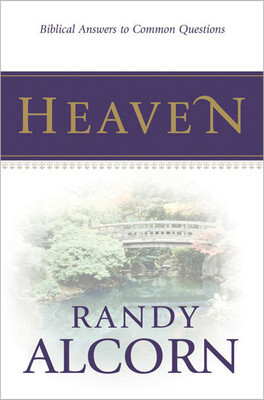 Heaven Booklet (20-Pack)
Heaven Booklet (20-Pack) 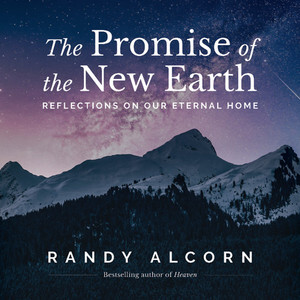 The Promise of the New Earth
The Promise of the New Earth
August 8, 2025
The Happiness of Knowing Christ Accomplished My Redemption

If my redemption depended on me, I would be constantly anxious, worried, and distraught. I would be proud whenever I held up my part, and devastated when I saw my imperfection, knowing I have fallen short again and wondering whether this chance was my last, since one day my failure would be my final failure. Heaven would be unattainable for me. I am too small to bear the weight of my sins, too bad to atone for my sins.
This is precisely why the most liberating truth, the most happy-making reality, is that my redemption does not depend on me. It was accomplished by the God-Man Jesus. His perfection is for me an impossible dream. He brought to the cross infinity, a size and weight beyond measurement and comprehension. As Revelation 5 demonstrates, only Christ is worthy to accomplish redemption.
And because He did that for me, I am happy beyond expression. No matter what else in my life brings suffering and turmoil, weighed in the balance, the love of Jesus manifested on the cross for me infuses my soul with wonder and joy.
A thousand years from now I will know no sin or suffering. But I will still know the love of Christ, and know it with an ever-deepening knowledge, and I will experience an ever-deepening joy.
Christ’s death and resurrection bring me a happiness that makes every secondary joy pale in comparison. What Jesus did for me is the hinge of human history, the hinge that allowed my door to swing from death to life, from misery to everlasting happiness.
By far the worst agony in all human history was chosen by someone with the ultimate eternal perspective. And He choose the horrors and shame, Scripture says, for the cause of His own happiness.
What? Does that sound like blasphemy? Didn’t He do it out of love for all of us? Yes. Didn’t He do it out of obedience to the Father? Yes. Didn’t He make the greatest and most selfless sacrifice in human history? Yes.
How then can we say He did all this with His own happiness in mind?
We can say it because Scripture says it: “For the joy set before him he endured the cross, scorning its shame, and sat down at the right hand of the throne of God” (Hebrews 12:2).
So what Pascal said of all men was true of Jesus also: “All men seek happiness.”
Recommended Reading
 Face to Face with Jesus
Face to Face with Jesus  Happiness (softcover)
Happiness (softcover)  It's All About Jesus
It's All About Jesus
August 6, 2025
Why Thinking Accurately about the Future Heaven Is Vital

Jonathan Edwards, the great Puritan preacher, often spoke of Heaven. He said, “It becomes us to spend this life only as a journey toward heaven . . . to which we should subordinate all other concerns of life. Why should we labor for or set our hearts on anything else, but that which is our proper end and true happiness?”
In his early twenties, Edwards composed a set of life resolutions. One read, “Resolved, to endeavor to obtain for myself as much happiness, in the other world, as I possibly can.”
Some may think it odd and inappropriate that Edwards was so committed to pursuing happiness for himself in Heaven. But Pascal was right when he said, “All men seek happiness. This is without exception. Whatever different means they employ, they all tend to this end.” And if we all seek happiness, why not do as Edwards did and seek it where it can actually be found—in the person of Jesus and the place called Heaven?
Tragically, however, most people do not find their joy in Christ and Heaven. In fact, many people find no joy at all when they think about Heaven.
What God made us to desire, and therefore what we do desire if we admit it, is exactly what He promises to those who follow Jesus Christ: a resurrected life in a resurrected body, with the resurrected Christ on a resurrected Earth. Our desires correspond precisely to God’s plans. It’s not that we want something, so we engage in wishful thinking that what we want exists. It’s the opposite—the reason we want it is precisely because God has planned for it to exist. Resurrected people living in a resurrected universe isn’t our idea—it’s God’s.
Nineteenth-century British theologian J. C. Ryle said, “I pity the man who never thinks about heaven.” We could also say, “I pity the man who never thinks accurately about Heaven.” It’s our inaccurate thinking, I believe, that causes us to choose to think so little about Heaven.
I talked about this subject—the theology of resurrection and common misconceptions about the afterlife—on the Love the Bible podcast with Kristin Nave, which you can watch below. I also answered some common questions about relationships, marriage, our beloved pets, and what we will do in Heaven:
https://www.youtube.com/watch?v=uGEX6PZI2Ls?si=gJMetvTcZjeCGIFq
Here’s the questions and topics we covered, if you’d like to watch a specific part:
00:00 Introduction, and Randy's study of Heaven
06:10 What are some of the greatest misconceptions about Heaven?
11:45 Where did the Old Testament saints go when they died? What about the present Heaven now? Do its inhabitants have some form of a body?
18:14 Will we walk with Jesus on the New Earth?
21:13 What about oceans on the New Earth?
25:58 What about marriage and relationships on the New Earth?
31:27 How Nanci Alcorn's testimony has impacted others
35:14 How prosperity theology doesn't fit with life under the Curse
36:55 Are our loved ones in Heaven aware of what's happening on Earth?
42:05 Should we feel guilty for loving animals and hoping they will be in Heaven?
55:18 What would you say to someone who feels unsure if they are going to Heaven?
58:55 What goes on at Eternal Perspective Ministries and what's ahead for your ministry?
Recommended Reading
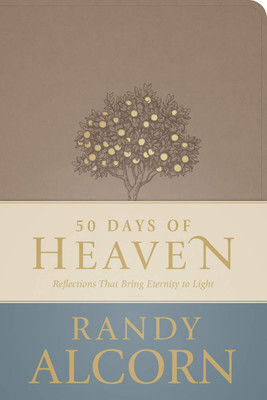 50 Days of Heaven (Special Edition)
50 Days of Heaven (Special Edition) 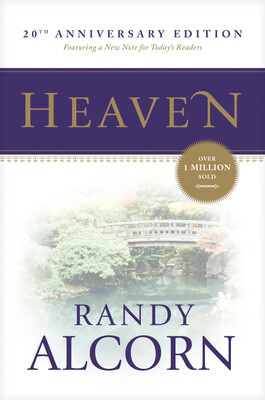 Heaven
Heaven  The Promise of the New Earth
The Promise of the New Earth
August 4, 2025
Does the Message of Finding Happiness in God Really Fit with Christ’s Call to Take up Our Crosses?

The message of finding daily happiness in Christ, which I share in my book Happiness, might seem contradictory to what Jesus says about our call to sacrifice our lives for Him: “If anyone would come after me, let him deny himself and take up his cross daily and follow me. For whoever would save his life will lose it, but whoever loses his life for my sake will save it. For what does it profit a man if he gains the whole world and loses or forfeits himself?” (Luke 9:23-25).
Many think that Jesus’ primary message here is the virtue of selflessness and self-sacrifice. But take another look: He calls us to lose life for His sake by appealing to our desire to find life! It’s not “selflessness” in the sense of doing what’s bad for ourselves; rather, it’s honoring and following Christ and thereby doing the best possible thing for ourselves!
God commands holiness, knowing that when we follow His plan, we’ll bring Him glory and be happy. Hence, as He often did, Jesus clearly appealed to us to act in the interest of our own ultimate happiness by making small temporary sacrifices to obtain large eternal gain.
C. S. Lewis began his great sermon “The Weight of Glory” by saying this:
If you asked twenty good men today what they thought the highest of the virtues, nineteen of them would reply, Unselfishness. But if you had asked almost any of the great Christians of old, he would have replied, Love. You see what has happened? A negative term has been substituted for a positive, and this is of more than philological importance. The negative idea of Unselfishness carries with it the suggestion not primarily of securing good things for others, but of going without them ourselves, as if our abstinence and not their happiness was the important point.
Lewis went on to make this critical point: “The New Testament has lots to say about self-denial, but not about self-denial as an end in itself. We are told to deny ourselves and to take up our crosses in order that we may follow Christ; and nearly every description of what we shall ultimately find if we do so contains an appeal to desire.”
When God calls upon us to deny ourselves and follow Him, what appears to be our loss is in fact our gain. Should we want to gain our lives or lose our lives? Losing our lives in Christ is the means to the end of joyfully gaining them!
Yes, Jesus calls His followers to sacrifice—but never to sacrifice long-term happiness. Paul, writing from prison and always realistic about the harsh realities of a fallen world, nonetheless experienced happiness in Christ, which he was eager to share with his fellow believers in Philippi: “If I have to offer my own blood with your sacrifice, I will be happy and full of joy with all of you. You also should be happy and full of joy with me” (Philippians 2:17-18, NCV).
The same Jesus who calls for sacrifice, promising that we’ll share in His suffering, also tells us to lay our burdens at His feet. We’re to take up our crosses daily, yet He promises that His burden is light. Life isn’t easy, but believers have the benefit of walking the hard roads side by side with a loving Father, a Son who’s our friend, and a comforting Holy Spirit.
Following Jesus will always produce the greatest, most lasting happiness—now and forever.
Recommended Reading
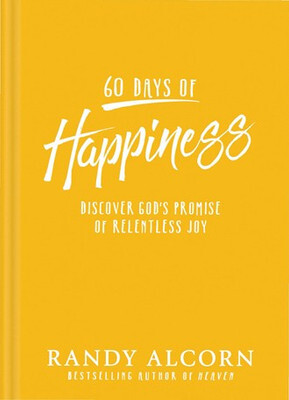 60 Days of Happiness
60 Days of Happiness  God's Promise of Happiness
God's Promise of Happiness  Happiness (softcover)
Happiness (softcover)
August 1, 2025
Biblically Responsible Investing: What Does It Mean to Be a Good Investor?

Investing doesn’t simply bring profits to the investor (sometimes it doesn’t even do that). It also profits the business in which we have invested. A Christian should avoid investing in any enterprise that makes its profit from people doing what they shouldn’t. For example, in most cases I believe people shouldn’t take out a second mortgage on their home. Consequently, for me to invest in high-yield second mortgages would be an attempt to profit from others’ poor decisions. I would not feel right doing that.
I wrote what follows (and much more) years ago about values-based investing, or biblically responsible investing, in my book Money, Possessions, and Eternity. I am including a small portion of it here in order to explain why I am so excited about a new book by Robin John called The Good Investor that I’m going to wholeheartedly recommend in this blog. If you have limited time, skip directly to what I have to say about that great new book.
Many Christians don’t evaluate the source of their investment income. God operates by a different standard: “You must not bring the earnings of a female prostitute or of a male prostitute into the house of the Lord your God to pay any vow, because the Lord your God detests them both” (Deuteronomy 23:18).
God does care where the money comes from. Of course, often a church or ministry can’t know the source of its contributions. The biblical principle applies primarily to the giver of the gift, not the recipient. But when pastors and leaders know that something has come from a source displeasing to God, they should address the issue, both for the sake of the donors—and those whose lives are affected by their choices—and the church or ministry. If this standard applies to the source of incoming funds, surely it applies even more to where we choose to put our money…
Consider Ephesians 5:1-11, which culminates in the command, “Have nothing to do with the fruitless deeds of darkness, but rather expose them.” How can we justify investing in companies that market the fruitless deeds of darkness? Isn’t funding evil a clear violation of the warning against establishing an unequal yoke with darkness (2 Corinthians 6:14-18)?
This certainly isn’t easy to track when there are so many companies with so many names. Most Christians would think it was wrong to invest in Playboy magazine. But the Houston-based Internet company Telescan specializes in data retrieval tools that it uses in partnership with Playboy’s Web sites. But who would know that if they saw Telescan on a long list of companies invested in by their mutual fund?
Hewlett-Packard supports Planned Parenthood, the nation’s largest abortion provider. Rick’s Cabaret International (NASDAQ symbol: RICK) is a public company self-described as a “premier adult nightclub offering topless entertainment.” In Putting Your Money Where Your Morals Are, Scott Fehrenbacher lists many objectionable companies that mutual funds invest in. Among these are Tenet (NYSE symbol: THC), the second-largest chain of hospital facilities in the nation, including some of which perform for-profit, elective abortions; and American Express (NYSE Symbol: AXP), which uses shareholder funds to actively promote homosexual causes.
….Those who own certain Fidelity mutual funds (which includes many Christians) have unknowingly helped support the government of Sudan, a genocidal regime that has systematically enslaved and persecuted Christians for decades. Various Christian denominations have invested in Talisman Energy, a huge Canadian oil company that does 25 percent of its business with Sudan. Vanguard and the state of New York were among those who divested themselves of Talisman after antislavery groups lobbied them. I hope by the time you read this it’s no longer true, but as of 2002, Fidelity still owned millions of shares in Talisman. Last year, I joined many others in addressing my concerns to Fidelity [I include in the book the letter I wrote them].
…Scott Fehrenbacher persuasively argues that it’s wrong for Christians to invest God’s money in music that promotes murder and rape (e.g. by funding gangsta rap), blatantly immoral movies, blood-spattering video games, pornography, nude dancing bars, abortion, alcoholism, and tobacco addiction. Some companies, including the large conglomerate that owns MTV, actively engage in trashing Christian beliefs and morals. That we would invest God’s money in companies sponsoring anti-Christian philosophies and activities seems unthinkable. Yet it happens every day.
The average Christian whose retirement program is in mutual funds or stocks managed by others has no clue where God’s money is actually going. Mutual funds serve to separate the investor from the companies invested in.
…Values-based investing isn’t a new concept. Scott writes in Putting Your Money Where Your Morals Are:
As early as the 1800s, the Quakers withdrew from business relationships and partnerships involved in the slave trade. In the 1920s, churches and denominations in America chose to actively screen their money from being invested in “sin stocks,” defined then as belonging to companies that manufactured products related to alcohol, tobacco, and gambling.
…If enough Christians would adopt a values-based approach, we might see a shift in priorities among some mutual funds or brokerages, so we could more wisely entrust them with our investments. But even if we’re the only ones to do this, our stewardship responsibility is to God, and he is the one who will ultimately evaluate and reward us.
It is every bit as true today as it was when I wrote and updated Money, Possessions, and Eternity: Mutual funds, today’s most common investments, distribute their investors’ money in a wide range of companies, some of which do things with the money that a Christian wouldn’t condone. The average Christian whose retirement program is in mutual funds or stocks managed by others has no clue where God’s money is actually going. Mutual funds serve to separate the investor from the companies invested in.
A brand new book is out, The Good Investor by Robin C. John, that I think should be read by every Christ-follower who gives financial advice or invests in companies, even if it’s only through a retirement plan. I love that Robin is not just encouraging us to avoid investing in what’s bad—as I did in Money, Possessions and Eternity—but to turn toward investing in what will bring joy and blessing to others around the world. Giving is vital, but investing with integrity is also crucial. He is addressing not just the negative aspect I dealt with in my book, but the positive aspects of investing. I highly recommend this book and was happy to endorse it.
Robin writes:
…what if it isn’t true that we’re powerless? What if it isn’t true that our little choices have no impact on the world around us? Our everyday decisions can make the world more what we long for it to be, more what God longs for it to be. And something most of us do already (investing) can participate in the world’s healing. The allocation of capital is a powerful tool; when used thoughtfully, and in connection with its true purpose, investing can create immense value and solve some of the world’s deepest needs. Or, when disconnected from its true purpose, it can extract value and cause extensive damage.
…Our money is doing work in the world. The question is whether our money is doing work that harms or work that helps. My hope as you read my story is that you will find inspiration to imagine how your investments can do good, how your investments can help and heal.
The possibilities for doing good, bringing power to bear on behalf of those most in need of relief, gives me hope. We’re not helpless. Our investments, our lives and work, our resolve to challenge the status quo—these are seeds of beauty.
Imagine how beautiful the world could be.
Check out Robin’s trailer for the book:
https://www.youtube.com/watch?v=ZoxWy1zBoG4?si=VUJICOPO6lLTSogj
And in this podcast episode with Faith Driven Investor, Robin talks about investing in companies that actually make the world better.
Recommended Reading
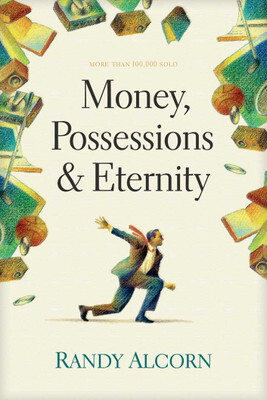 Money, Possessions and Eternity
Money, Possessions and Eternity
July 30, 2025
An Awareness of the Supernatural Should Never Be Separated from the Daily Disciplines of Following Christ

A reader wrote our ministry:
God has been opening my eyes to the fact that this world is not all there is, but there is a true spiritual battle going on. I want to be at a church where people are living in the reality of the spiritual realm and not just saying they believe it but then living like only this is reality. What cautions/advice do you have to offer?
I certainly understand the sentiment expressed in this comment. I would like to see more vibrancy in churches, more purity, more abandonment, more sold-out commitment to Christ. I would like to see it expressed in the overflowing joy of Christ, in risking rejection in sharing the gospel, risking being called fools to stand for Jesus, and to speak up for the unborn, and being willing to sell our possessions and give to the poor and live in more modest houses and drive more modest cars, and turn off the TV and put down the smart phone to spend time with God. I would like to see more vibrant, Christ-exalting living—first in myself, and then in the Christian community as a whole.
But we need to be careful and discerning. There are groups of people who enjoy displays of the supernatural that are not true works of the Holy Spirit but productions of their desire to “see more” and “hear more” and reflect a susceptibility to power of suggestion from others. A few questions are necessary. Are they in fact more sexually pure and less materialistic, for instance, than the church at large? Are they more obedient and servant-hearted? Or are they just more excitable when it comes to miracles? When fascination with or involvement in the supernatural is separated from the disciplines of daily following Christ, it is a dangerous thing. (I know people who were seemingly following Christ based on their bold statements about the unseen realm and their great insights into demons, but in fact were not.)
I am all for miracles, and I believe God does them. But I am skeptical at times because sometimes these claims are unaccompanied by the disciplines of godly living. For instance, when someone is constantly having “supernatural experiences” but is addicted to internet pornography or is being unfaithful to their marriage vows, or is living in pride and self-congratulation, then obviously something is seriously wrong.
A thirst for awareness of the spiritual realm is understandable. I share it. For years, as a young Christian, I would pray that God would send me supernatural signs and wonders. I heard of people having angels appear, and I wanted to see them too. I prayed for at least a year, almost daily, sometimes weeping, that God would give me the ability to speak in another tongue. But over the years, I have learned to see the supernatural in countless divine appointments and moments brought to me by my Savior each day. I am all for the supernatural, and I believe God is doing a supernatural work in me often, perhaps even right this moment, but I don’t think the spiritual life involves working yourself into a frenzy. In Scripture I see the Holy Spirit doing miracles, but not people making it happen themselves or pretending it is happening when it isn’t.
So my advice is this: choose a church carefully, wisely, biblically. Make sure not simply that the doctrinal statement is solid, but that the Word of God is preached; that people are not elevated above Christ and the message; and that experiences do not overshadow the Scriptures, but are seen through the lens of God’s Word.
Recommended Reading
 Lord Foulgrin's Letters
Lord Foulgrin's Letters 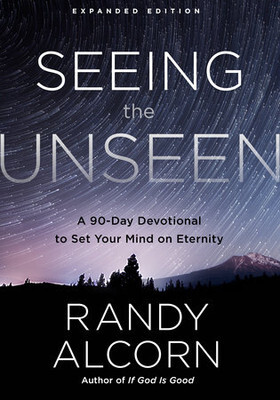 Seeing the Unseen, Expanded Edition
Seeing the Unseen, Expanded Edition
July 28, 2025
What Will the Eternal Heaven Be Like? My Interview on Remnant Radio

Scripture has much to say about God’s eternal kingdom on the New Earth. His original plan for us, to rule the earth to the glory of God, was never abandoned. In fact, what was laid out in Genesis 1-2, the first two chapters of Scripture, is precisely what is finally realized in Revelation 21-22, the last two chapters. Christ’s redemptive work wasn’t to snatch away people’s souls to live forever in an angelic realm, but to redeem our whole persons, including our bodies, and the fallen world in which we live. God promises not only new bodies, but a New Earth! (See 2 Peter 3:13.)
In my years of writing about Heaven, I’ve found there are dozens of questions I'm repeatedly asked. But here are the top five:
Will we still be ourselves, with our memories of this life?
Will we know our loved ones and have ongoing relationships with them?
What will we do, and won't Heaven be boring?
Will we have bodies and eat and drink and travel and explore and play—in other words, will we live truly human lives?
Will there be animals—and is it possible that the pets we've loved will be there?
Speaking of questions about Heaven, I enjoyed answering several during my conversation with Josh Lewis and Michael Rowntree, on their podcast The Remnant Radio.
You can watch the full video here:
https://www.youtube.com/watch?v=yqJxrUR24Xw?si=DiJlgE-ijSYIeTlF
If you’d like to jump to different questions we covered, here is what we discussed:
7:53 What is the difference between the Present Heaven and the New Earth?
15:06 Where do people go when they die?
19:10 What about Hades and its relationship to Hell?
25:15 Will we have a personal identity in the resurrection? Will we be ourselves on the New Earth?
33:18 What about gender and marriage on the New Earth?
40:49 What about roles, leadership, and government on the New Earth? 46:28: Will there be animals on the New Earth?
52:51 Will animals talk on the New Earth? What about meat eating?
1:05:35 If there are realities Scripture reveals about the age to come, should we try to apply them to life on the earth right now?
Recommended Reading
 50 Days of Heaven (Special Edition)
50 Days of Heaven (Special Edition)  Everything You Always Wanted to Know About Heaven
Everything You Always Wanted to Know About Heaven  Heaven
Heaven
July 25, 2025
Find Your Identity in God, Not Your Suffering

We live in a time when we are defined as disabled, bipolar, alcoholic, ADHD, victims of lupus, cancer, Parkinson’s disease, and nearly everything else. Our condition easily becomes our primary reference point.
I am an insulin-dependent diabetic, but my disease doesn’t define me. I learn what’s necessary, take care of myself, and live. I shouldn’t become preoccupied with a disease any more than with a career, a hobby, possessions, or a retirement program. I want Jesus Christ first, and my family second, and then my church and ministry to define my life.
David Powlison, now with the Lord, wrote,
People will often express their care and concern by inquiring about your health. That’s good, but the conversation easily gets stuck there. So tell them openly about your sickness, seeking their prayers and counsel, but then change the direction of the conversation by telling them what your God is faithfully doing to sustain you with ten thousand mercies. Robert Murray McCheyne wisely said, “For every one look at your sins, take ten looks at Christ.” ...For every one sentence you say to others about your cancer, say ten sentences about your God, and your hope, and what he is teaching you, and the small blessings of each day. For every hour you spend researching or discussing your cancer, spend ten hours researching and discussing and serving your Lord.
We are to receive comfort from God and His people, and then we are to give that comfort to others. People who pour themselves into loving God and other people find their identity becomes clear. They rest in the fact that God has a purpose and plan for their lives, and they are here as God’s ambassadors and ministers to meet the needs of others. This is critical to our sense of identity. God, not suffering, should define who we are.
Recommended Reading
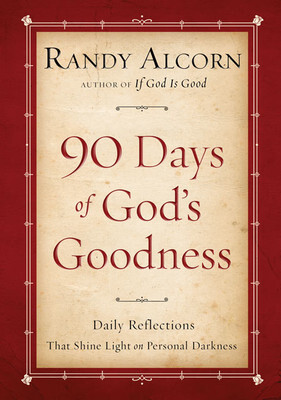 90 Days of God's Goodness
90 Days of God's Goodness  Seeing the Unseen, Expanded Edition
Seeing the Unseen, Expanded Edition 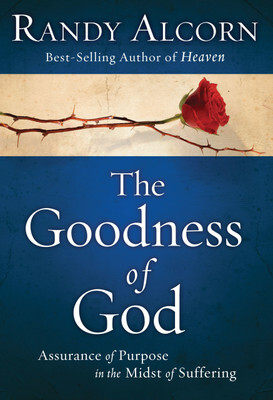 The Goodness of God
The Goodness of God
July 23, 2025
How Can I Discern Whether a Certain Christian Book or Podcast Is Good to Read or Listen to?

Note from Randy: This Q&A appeared in the latest issue of our ministry’s magazine. My thanks to EPM staff member Stephanie Anderson for her answer.
Question from a reader:
How can I discern whether a certain Christian book or podcast is good to read or listen to? I have a hard time knowing which ones hold to good teaching and honor what's found in Scripture.
Answer from Stephanie Anderson, EPM staff:
We are to be like the Bereans, who carefully checked the Apostle Paul’s teachings against Scripture to discern whether what he said was true (see Acts 17:11). Scripture also tells us to “test all things. Hold on to what is good” (1 Thessalonians 5:21).
Our ministry frequently receives questions about whether we/Randy are familiar with a particular resource, and the following are some evaluative tips we often use.
In evaluating books, it can be helpful to check a book's Amazon page, and see who it is published by and also who has endorsed the book. Reading customer reviews (both the positive ones and the negative ones!) can give you an idea of the book's content as well as potential pitfalls.
In her article Becoming a Discerning Christian Reader, Brandi Davis offers these tips:
Check the author’s social media and/or website. If you see ungodly fruit there, it will most likely show up in what they write.
Research the publisher of the book. Some publishers target a very specific Christian demographic, and knowing more about them may help you make a clear decision.
Read a sample. Many online booksellers allow you to read the first few pages of a chapter on their website.
In the case of a podcast, consider looking through their website and episode descriptions. See what guests have been on the podcast. After sampling some episodes, here are some questions to ask:
Does this podcast lead me to have a deeper love for God and His Word?
Does this podcast point me to Christ and help me to know and love Him more?
Does this podcast help me obey Philippians 4:8 (thinking about whatever is true, noble, right, pure, lovely, and admirable)?
Could my time be better spent studying/ listening to other resources?
Randy writes, “Our theology tends to come from whatever we trust.” We want to encourage readers to be wise and careful in what they put their trust in.
In his article 15 Discernment Diagnostics, Kevin DeYoung writes, “Mature Christians do not cast a critical eye on everyone and everything a hair’s breadth different from them. But they are discerning, and they are careful.”
Recommended Reading
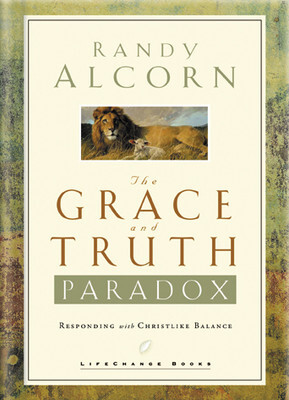 The Grace and Truth Paradox
The Grace and Truth Paradox



